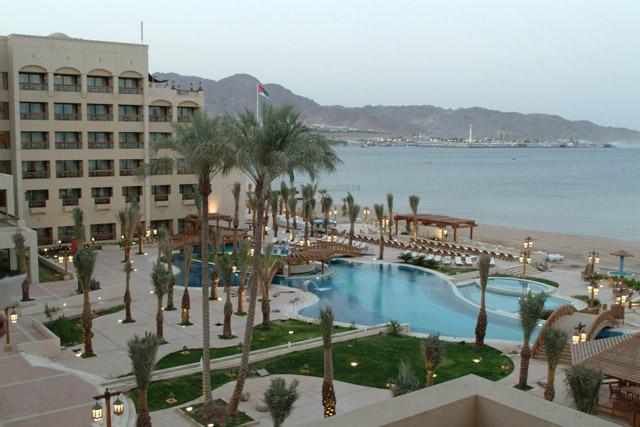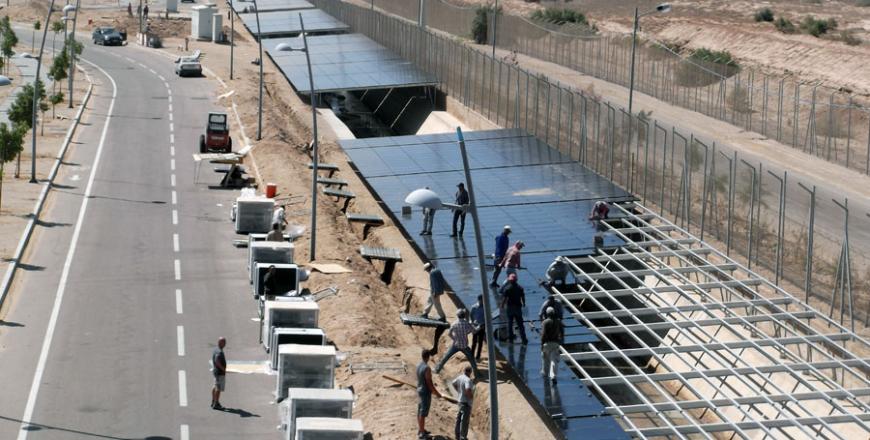You are here
Aqaba planners ready with diversified tourism package for port city, district
By Mahmoud Al Abed - May 09,2015 - Last updated at May 09,2015

AQABA – The Aqaba Special Economic Zone Authority (ASEZA) and its investment arm, Aqaba Development Corporation (ADC), are working on an ambitious plan to diversify the tourism product to attract and “retain” foreign and local tourists and create more opportunities for the zone’s residents.
In an interview with The Jordan Times at his office in Aqaba Wednesday, ASEZA Chief Commissioner Hani Mulki said what Aqaba offers currently is “very limited… not much for a tourist” to stay for a longer period in the area.
“We have the beach and hotel rooms, which is great, but not enough. ASEZA, through ADC, is creating, enriching and enlarging more locations.”
The flaw in the Aqaba tourism product, according to Mulki, and several officials and investors interviewed by The Jordan Times during a tour of the city, is that tourists do not stay long enough to spend money that makes a difference to businesses and the local community.
The ASEZA chief said the plan does not only seek prosperity for original Aqaba residents, but also opportunities and better lives for job seekers from the Kingdom's southern governorates, where high unemployment and idle business are acknowledged at different levels.
There is much in the pipeline or on the drawing board, according to plans made available to The Jordan Times, and the private sector is contributing through mega, multi-billion developments like Ayla, Saraya, Marsa Zayed, Tala Bay and others, let alone the huge industrial and port-related projects.
Mosaic
ASEZA relies in its vision on two kinds of projects that are likely to attract visitors wishing to stay longer. The first is already in progress, such as Ayla’s golf course.
The world-class facility is projected to host international tournaments that will attract players as well as fans from around the world, encouraged by the inviting Aqaba weather, according to Ayla’s managing director, Sahl Dudin.
He said that unlike Gulf countries which offer a golfing experience, Aqaba’s summer is not spoiled by high humidity.
Saraya, for its part, is building a conference centre that will fill a gap in the Aqaba landscape as the Dead Sea has for the past years dominated the sector, according to the company’s officials.
Executives interviewed by The Jordan Times from different sectors underlined the concept of complementation rather than competition.
Abdullah Sharrah, Saraya’s social responsibility officer, gave an example. His company is building a water park that will be put at the disposal of Ayla’s residents and visitors, while Saraya’s will have access to the golf course.
ADC has prepared a long list of proposed projects offered for partnership with local or foreign investors based on various contract formats, including build, operate and transfer.
Those related to tourism include the Yacht Club expansion, Aqaba Authentic Hotel and Resort, built on a concept rooted in the port city’s heritage, and a town park that will have an exhibition centre, meeting halls, a water dome, botanical garden and a cultural centre, among other facilities aimed to diversify activities visitors can indulge in.
Other projects include a drive-in cinema, a world-class football stadium with tracks for athletics, a marine science station featuring a museum, an aquarium and a mini-dolphinarium, and Aqaba Recreational Park, a major entertainment landmark.
According to the ASEZA chief commissioner, an envisioned project like the North Business District is not directly related to tourism, but it is expected to support the sector because executives who arrive in Aqaba to check on their businesses in the city will need to stay for a few days on their work trip.
Shopping challenge
Mulki said planners are challenged to address a negative image about shopping in Aqaba. The official acknowledged that the low quality of goods in the market is an obstacle facing efforts to attract shoppers from the rest of Jordan and the region.
This requires talking to the private sector, especially brand name manufacturers, to invest in Aqaba and open outlets that would offer quality items benefiting from the special status of the Red Sea resort as a special customs zone, though not a free zone, as more than one official made clear.
According to Mulki, some investors fear that if they start businesses in the zone, they will be denied benefits ensured by the free trade agreements Jordan has signed with international economic powers and Arab countries, which, he said, is a misconception. ASEZ, he noted, has access to all these benefits and so the garment industry is welcome to expand to the zone.
“Most of the problems stem from misinterpretation of the law,” Mulki said.
Economic empowerment of community
The end-goal of all these projects and plans is the welfare of citizens, the ASEZA chief said. He stressed that so far, Aqaba has succeeded in transforming local society where the middle class has become the prominent component. “Few are poor and few are filthy rich.”
Aqaba has become a magnet for employment. Projects like Marsa Zayed, which will build 30,000 housing units over the coming years, have already hired thousands of Jordanians in the construction phases, while thousands more will find jobs when the developments are completed, especially in the hospitality sector.
The majority of job seekers come from the southern governorates, a matter which, according to Mulki, eases the pressure on Amman.
However, the key social achievement, he said, is that the people of Aqaba have digested the new concept of their district as a city and region of Jordan with a special function and have begun to accept diversification and the fact that the once small fishing town is evolving into a full-fledged cosmopolitan urban centre.
Related Articles
AMMAN — The Aqaba Special Economic Zone Authority (ASEZA) will award the Hyatt Regency Aqaba Ayla Resort a five-star deluxe classification t
The Aqaba Special Economic Zone Authority (ASEZA) and the Aqaba Development Company (ADC), the central development company of ASEZA, participated in the Cityscape Global Exhibition.
AMMAN — A major developer in Aqaba on Tuesday connected a 3.2 megawatt (MW) solar power plant to the national electricity grid, launching on
















